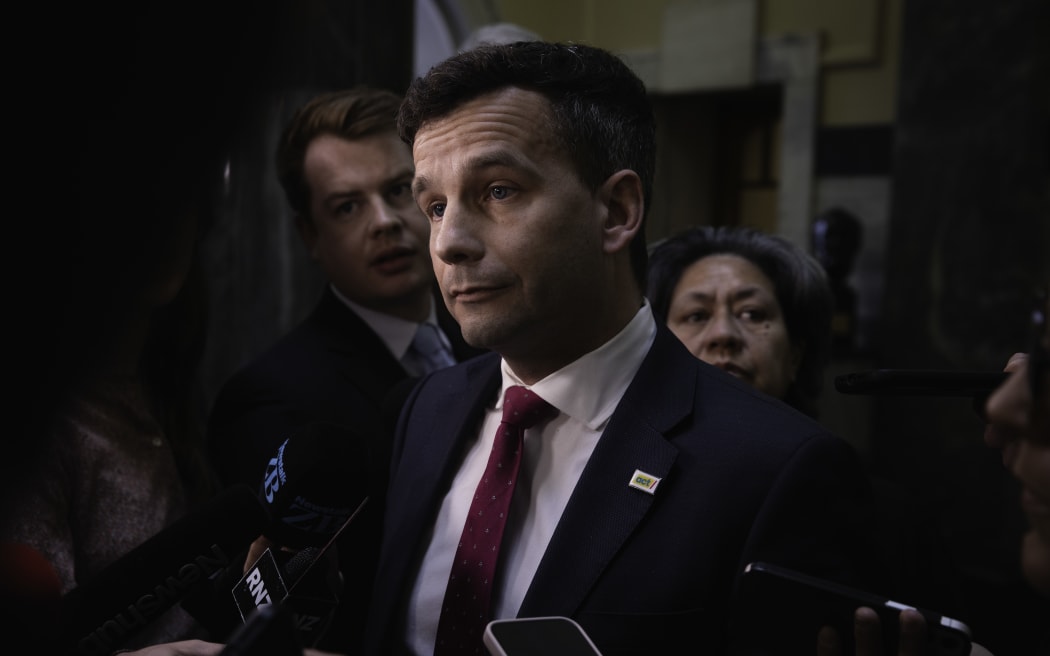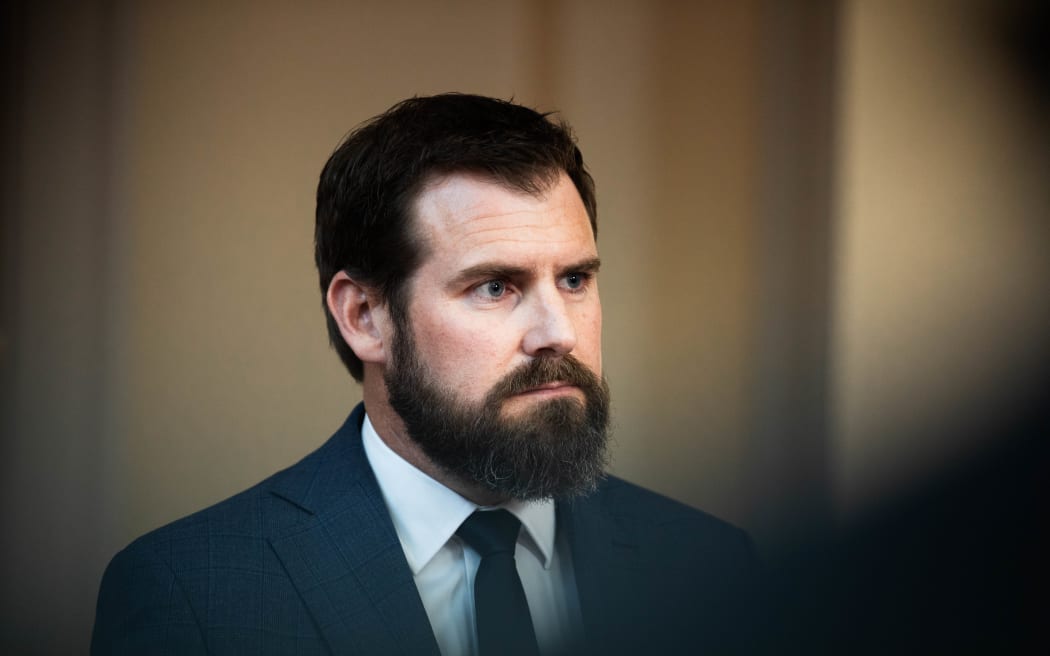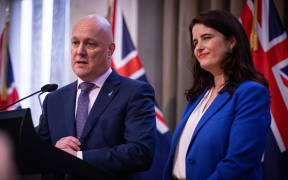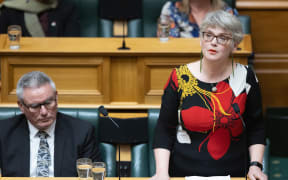
Photo: RNZ
By the end of the week the 1News Verian poll, released on Monday, had been thoroughly analysed and it was grim reading for Labour.
National had gained two points to reach 37 percent, Labour had dropped four points and had slumped to 29 percent.
Commentators reached similar conclusions - it was very bad news for Labour.
Political analyst Bryce Edwards: "Labour appears to be in something of an electoral death spiral. When a party in government drops into the 20s just weeks out from voting, the psychological effect can be huge. Increasingly, the public will not believe that Labour can win this election.
Edwards' article is on RNZ's website.
The Herald's political editor Claire Trevett: "It will feel very much like the chance of a third term is slipping away at pace ... once the polling starts to slide, it is very difficult to reverse. It is also very difficult to hold on to the discipline, unity and enthusiasm that are needed to reverse it."
Stuff's political editor Luke Malpass: "There's still plenty of weeks to go but the polls create their own momentum and Labour now risks the perception setting in that it cannot win."
The Spinoff's Toby Manhire looked at the trend in recent 1News Verian polls and concluded "the trajectory is unmistakable".
His figures showed the steady decline in Labour's support - January 38 percent, March 36 percent, May 35 percent, July 33 percent, August 29 percent.
"What matters in polls is the pattern, and the pattern as far as Labour is concerned in this poll is clear enough," Manhire said.
The latest poll was taken after Prime Minister Chris Hipkins played one of his aces - assuming he has others still to play - and announced a re-elected Labour government would remove GST from fruit and vegetables.
A fall of four points showed it did not work.
"Voters are clearly not convinced that 25 cents off a turnip is worth it," Trevett said.
The poll also showed the Greens gaining two points to reach 12 percent and ACT gaining one point to reach 13 percent. NZ First had also gained one point to reach 4 percent.
The strength of ACT and the Greens has been one of the unusual features of this election so far. While Labour and National have cautiously sought to attract voters from the centre, those on the right and the left appear to have found the more robust policies of the minor parties appealing.
It was telling that the Greens gained two points while Labour dropped four, which could be an indication its left-leaning supporters are migrating because of Hipkins' decision to drop the wealth tax and the tax-free threshold it would have paid for.
After he made the captain's call on that, Trevett reported: "The Greens will be quietly stoked about it. They are targeting Labour voters to grow their own base."
She also reported it had enraged traditional Labour voters: "One long-standing, loyal Labour voter told me this week he was so angry he was voting Green."
Core reading, writing, maths policy 'unusual'
Hipkins reacted to the 1News Verian poll by vowing to fight on, and Labour continued to crank out election policies.
The first was a plan to make reading, writing and maths "core teaching requirements" to ensure consistency regardless of which school a student attended, RNZ reported.
"What we're talking about here is the principles that underpin really robust teaching in these areas," said Labour's education spokesperson Jan Tinetti.
"This is about making certain we have a consistent approach across the country."
She said the model would outline what teachers had to cover at each year level.
The three subjects are already a mandatory part of the school curriculum.
It did not go down well with the secondary teachers union.
Post Primary Teachers Association acting president Chris Abercrombie told Checkpoint the move was highly unusual.
"It is very unusual to be told how to teach something," he said.
"Doctors don't have laws about how they treat patients day to day, lawyers don't have laws about how they prosecute their clients' cases, making laws about how teachers teach is the thin end of the wedge."
University of Otago college of education associate dean Naomi Ingram said mandating the model ensured it would get more government support.
"They're going to throw resources at it and that will help teachers," she said.
Educational Institute (primary teachers union) president Mark Potter said the union supported the model but warned it would not work if it was too detailed and prescriptive.

Photo: AFP/ ANP MAG - Koen van Weel
Vape policy disappointing
The second policy announcement managed to disappoint both anti-smoking and anti-vaping groups, RNZ reported.
Labour said it would limit the number of vape stores nationwide to 600 and introduce a licensing regime if re-elected in a bid to crack down on youth vaping.
"Vapes are far too widely available, so tougher measures are now needed," Hipkins said.
Capping the number of vape stores at 600 would reduce the number by more than half.
All retailers, including dairies and petrol stations, would need to obtain a licence to sell vaping products.
Those concerned about youth vaping did not think it was enough.
"This won't even happen unless they get elected," said Vape Free Kids NZ spokesperson Tammy Downer.
"We've got a massive issue today and families that are struggling with issues don't have any support or anywhere to go because cessation services are for people that are smoking."
Dairy and Business Owners Group chairperson Sunny Kaushal called it a war on dairies.
"This is panic-based policy making, you know who is going to be the biggest loser in this scenario? It will be Smokefree 2025 year, right. Vaping is the biggest weapon we had to stop smoking in New Zealand."
Vaping Industry Association chairperson Jonathan Devery told Checkpoint it was a desperate policy by a struggling government.
"It's going to be easier for people to access tobacco than it will be for vaping products. People will revert back to smoking."
National's health policy controversial
National's policy contribution was also controversial.
Party leader Christopher Luxon announced a National-led government would put $280 million into cancer treatments, paid for by reintroducing the $5 prescription fee the government abolished.
Pensioners and low income people would continue to get free prescriptions.
"Cancer survival rates here lag behind Australia, partially due to Australia's broader funding of cancer medicines," Luxon said.
The announcement gave details of 13 drugs that would be funded.
Hipkins said it was a "smoke and mirrors" policy which took medicines away from one group and gave it to another.
Luxon said around 1000 people a year would benefit from switching funding from universal free prescriptions to the cancer drugs.
Hipkins said in the month and a half since the fee was abolished, three million prescriptions had been issued supporting the health of about 900,000 people.
He also said it was dangerous for politicians to pick and choose which drugs should be funded.
So did former Te Whatu Ora chairperson Rob Campbell.
Life saving cancer drugs should not be used as a carrot and stick by politicians, he said in an article published by the Herald.
Campbell said Pharmac funding was a legitimate political debate.
"But it is very dangerous for politicians to start picking preferred medications. Each preference on finite funding is necessarily a choice at the expense of another choice. 'I can get you this' means 'I will not get you that'."
Cancer Society medical director Dr Kate Gregory told Morning Report on the one hand it was fantastic news but on the other, a lot of infrastructure would be needed to make sure the drugs could even be delivered.
Pathology services, already under huge pressure, would have to carry out tests to determine which drugs would be effective for a patient, nurses would have to administer them and there would have to be physical space and treatment clinics.
"There's quite a lot of work that National would need to do with the oncology community to make sure that we can actually deliver these drugs properly and safely," she said.

ACT Party leader David Seymour. Photo: RNZ / Angus Dreaver
David Seymour joke doesn't go down well
That was the serious side of this week, while in Parliament, a David Seymour joke that no one thought was funny made headlines.
The ACT party leader made the joke on Newstalk ZB. It caused thousands of words to be written and a surprising amount of trouble. It also made it into the debating chamber.
The subject of the discussion was wasteful spending and the Ministry for Pacific Peoples, which ACT thinks should be dismantled.
What he said was: "Well, in my fantasy, we'd send a guy called Guy Fawkes in there and it'll be all over. But we'll probably have to have a more formal approach than that."
Asked to confirm he was talking about blowing up the ministry, he replied "that's clearly a joke".
It turned into a row in Parliament, with Te Pāti Māori piling in and Hipkins saying he did not think making statements about blowing people up was the sort of thing responsible leaders should say.
Others who did not see the funny side were Deputy Prime Minister Carmel Sepuloni, the Greens' Golriz Ghahraman and Cabinet minister Andrew Little who thought ACT was being "openly racist".
The Herald's Pasifika editor, Vaimoana Masi, said "it felt like a direct attack on us as a people - our family".
Seymour was annoyed about his joke morphing into blowing up Pacific people and in Parliament sought to set the record straight.
He said Hipkins had confused a government department with a race of people, thus "turning a debate into something it never needed to be".
What he got back from Hipkins was: "I believe that member is deliberately and wantonly playing the race card in this election and he should be ashamed of himself."

National's Tim van de Molen was stood down from his portfolio responsibilities after the Privileges Committee found him in contempt of Parliament. Photo: RNZ / Samuel Rillstone
Party problems
Seymour soon had another problem to deal with.
1News revealed ACT election candidate Elaine Naidu Franz had resigned after online comments likening vaccine mandates to concentration camps.
Another candidate, Darren Gilchrist, had apologised for comments which included describing former prime minister Dame Jacinda Ardern as "Jabcinda".
A third candidate, Anto Coates, who referred to Covid-19 as "mass hysteria", stepped down more than a month ago.
Seymour said the concentration camp reference was "absolutely unacceptable" and he had spoken to the candidates after the media drew his attention to their comments, RNZ reported.
"One has said 'actually I don't agree with the statements anymore', the other has said 'actually I don't want to be a candidate anymore' and I agreed with that on the spot," Seymour said.
He defended the party's vetting process.
"We've actually done a very good job of vetting over 60 candidates. There are some that have slipped through the net and they're now gone."
National was not immune from personnel problems, after spending months talking about Labour's internal issues.
Luxon stood down one of his MPs, Tim van de Molen, from his portfolio responsibilities after the Privileges Committee found him in contempt of Parliament over threatening behaviour towards Labour's Shannan Halbert.
The MP was referred to the Privileges Committee last month after a complaint that he had threatened or intimidated Halbert during a select committee meeting in June.
Details of what van de Molen said and did at the time are in RNZ's report.
Luxon said the MP's behaviour was not up to the standard he expected. Van de Molen has apologised in Parliament for his behaviour.
The Privileges Committee has recommended van de Molen be formally censured by Parliament.
*Peter Wilson is a life member of Parliament's press gallery, 22 years as NZPA's political editor and seven as parliamentary bureau chief for NZ Newswire.







